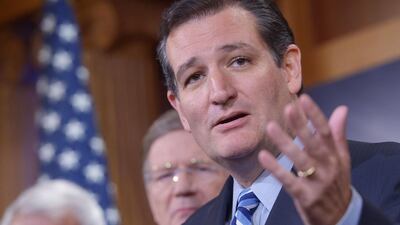My mother was fond of saying “if you want someone to hear you, you must first listen to them”. If you do this, she would say, “you will be able to speak with people and not at them”.
What happens when you don’t follow this simple rule was on display during the In Defence of Christians conference in Washington last week. Addressing an audience of mostly Arab Christians, Senator Ted Cruz launched a passionate defence of Israel arguing that “Christians have no better ally than the Jewish State”. The audience booed.
Undeterred, he continued: “Those who hate Israel hate America” and “Those who hate Jews hate Christians”. When the audience would not stop booing, he cut short his remarks saying “some here are so consumed with hate ... if you will not stand with Israel and Jews, then I will not stand with you”. He then walked off the stage.
It is generally known that Mr Cruz can be a demagogue. He is also considered to be quite bright and calculating. And so, two distinct scenarios come to mind. It is possible that he went to the conference to provoke the crowd. It is more likely that he had no clue about the reaction his remarks would receive and was, therefore, stunned by the audience response and that it was only midstream that he decided that he could use the cat calls to his political benefit.
In either case, Mr Cruz displayed a shameful insensitivity to the concerns of Middle Eastern Christians. Like too many of his colleagues, he can only see the Middle East through the lens of what is good for Israel. He had no understanding of his audience.
When he left the event he issued a statement to the Breitbart website calling the audience reaction “a shameful display of ... ignorance and bigotry”. He lamented that while he had wanted to lay out a litany of examples of Christians and Jews persecuted by “Islamic radicals”, his efforts were upended by “bigotry and hatred” and “the corrosive evil of anti-Semitism”.
But the only ignorance and bigotry on display was his own. Blinded by his own lack of understanding, Mr Cruz appeared to be more interested in scoring political points than in taking the time to know what Christians in Lebanon, Palestine, Jordan, Syria, Egypt and Iraq really feel and want.
If he had listened to the six Patriarchs of Eastern churches (as Barack Obama did in a lengthy meeting with the prelates on Thursday), all of whom also addressed the conference, he would have heard them speak of their history of coexistence with Muslims. They, of course, are deeply concerned by the rise of extremism and horrified by the brutally violent excesses of those who are using a distortion of Islam to consolidate power. These church leaders seek the defeat of extremism and the creation of a social order based on equal rights and reconciliation among all faiths.
But Mr Cruz wasn’t listening. He came to the event with preconceived notions and a prepackaged message.
For decades now, American politicians have paid scant attention to the realities of the Arab world. Their awareness of the region has been framed by Israel and oil. The first they felt was necessary for their electoral ambitions and the other was important for the US’s economic well-being. Seeing the world through this narrow view produced a “willed ignorance”. It was not just that politicians did not know about what Arabs were saying, they did not want to know.
This has created a dangerous state of affairs. Since the end of the Vietnam War, the US has spent more money, sent more weapons, fought more wars, lost more lives and has more interests at stake in the Middle East than anywhere else in the world, and yet Americans still have too little understanding of the region’s people, history and culture. Because the US has little understanding of Egyptians, Palestinians, Lebanese, Syrians and Iraqis, it has engaged in tragic and costly foreign policy blunders.
It appears that policymakers want to have it both ways. They want to pass insensitive anti-Arab legislation and make outrageous statements about Arabs and Muslims and yet are confounded by the Arab reactions to these insults.
So it was with Mr Cruz. Despite his reputation, he was set to deliver a speech with which I am certain many of his congressional colleagues would have concurred. After all, what could anyone find offensive in praising Israel and denouncing radical Islam, especially to an audience of fellow Christians?
But it was not the message this audience needed or wanted to hear, precisely because they are suffering and because many of them have suffered at the hands of Israel. Because he didn’t care to know them or to listen to them they booed and booted him off the stage.
There is a lesson in this for those who care to learn. And it’s not only about the importance of communicating. The US president has announced that America will re-engage militarily in Iraq and Syria.
Before it does, it is important that America does not repeat the mistakes it made in Iraq and Afghanistan. It needs to be certain that it understands the social and cultural dynamics at work in the Middle East. Unless it does so, the US will make another series of fatal errors that have marked our history of involvement in this region.
James Zogby is the president of the Arab American Institute
On Twitter: @aaiusa


